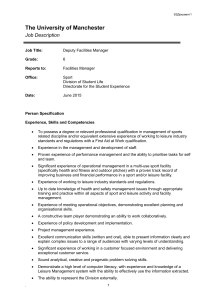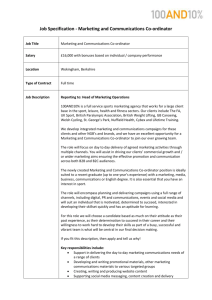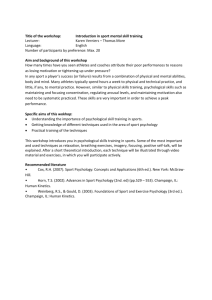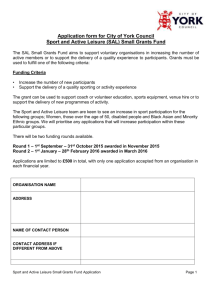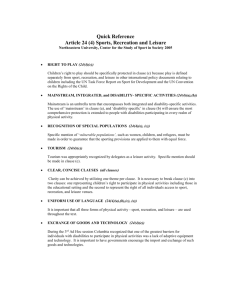Defining sport and leisure participation - Faculty
advertisement
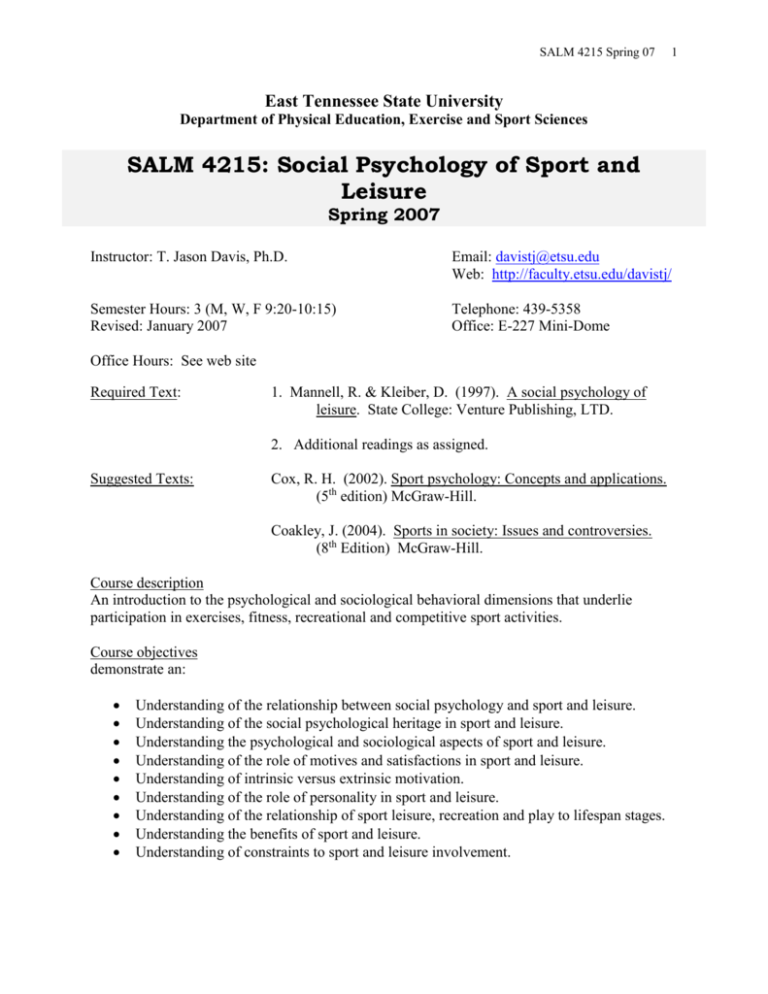
SALM 4215 Spring 07 1 East Tennessee State University Department of Physical Education, Exercise and Sport Sciences SALM 4215: Social Psychology of Sport and Leisure Spring 2007 Instructor: T. Jason Davis, Ph.D. Email: davistj@etsu.edu Web: http://faculty.etsu.edu/davistj/ Semester Hours: 3 (M, W, F 9:20-10:15) Revised: January 2007 Telephone: 439-5358 Office: E-227 Mini-Dome Office Hours: See web site Required Text: 1. Mannell, R. & Kleiber, D. (1997). A social psychology of leisure. State College: Venture Publishing, LTD. 2. Additional readings as assigned. Suggested Texts: Cox, R. H. (2002). Sport psychology: Concepts and applications. (5th edition) McGraw-Hill. Coakley, J. (2004). Sports in society: Issues and controversies. (8th Edition) McGraw-Hill. Course description An introduction to the psychological and sociological behavioral dimensions that underlie participation in exercises, fitness, recreational and competitive sport activities. Course objectives demonstrate an: Understanding of the relationship between social psychology and sport and leisure. Understanding of the social psychological heritage in sport and leisure. Understanding the psychological and sociological aspects of sport and leisure. Understanding of the role of motives and satisfactions in sport and leisure. Understanding of intrinsic versus extrinsic motivation. Understanding of the role of personality in sport and leisure. Understanding of the relationship of sport leisure, recreation and play to lifespan stages. Understanding the benefits of sport and leisure. Understanding of constraints to sport and leisure involvement. SALM 4215 Spring 07 2 Potential Topics Include Social Psychology Social sciences Definitions of sport and leisure Social psychological approaches to studying sport and leisure Social Psychology of sport and leisure Social influences on spectator sports Social influences on camp behavior Sport and Leisure as behavior Measuring sport and leisure behavior Defining sport and leisure participation Psychological states of sport and leisure Motivation and perceived freedom Personality and sport and leisure Satisfaction Sport and leisure over the lifespan Psychological benefits of sport and leisure COURSE ACTIVITIES: Written exams Course Notebook Current Events Term Paper GRADING PROCEDURE: Exams Current Events Course notebook Term Paper Rough Draft (5% & Final 15%) TOTAL 50% 10% 20% 20% 100% The student's grade in this course will be determined by combining grades from four (4) areas: (a) Written exams; (b) course notebook; (c) current events; (d) term paper. During this course four (4) written exams will be administered including a comprehensive final exam. These exams will be graded on a 100 point basis and will constitute 50% of the final course grade. Below is an overview of additional course requirements. More information will be presented in class. 1. Notebook - Purchase a composition type notebook (you may need more than one). Each Friday you will hand this in to me and I will evaluate it. Each entry must include three sections. First, you must include your class notes as well as notes on the reading. Second, describe what you learned since the last entry. This must be done by writing the statement "This week I SALM 4215 Spring 07 3 learned..." and follow this with no more than 5 statements per page, with lots of space between statements. Provide a summary statement at the end. The third section should describe the significance of what you have learned as well as applications of what you have learned to the services you will deliver. This section will require thought. Any materials are appropriate for answering these questions, including outside readings and experiences. The minimum expectation is three pages every week. More is expected as the semester goes along. This may be difficult at first but will get easier with experience. YOU MAY USE YOUR NOTEBOOK DURING THE EXAMINATIONS. Grading scheme on notebooks0 points - not done or not original work 1 point - partially done but missing sections 2 points - completed with all sections 3 points - completed with some thought and insight 4 points - completed with a great deal of thought and insight including multiple sources Current Events: Periodically, you will be required to purchase an USA Today newspaper (No Electronic Versions will be accepted!!). You are to provide a review of an article that relates to topics/ideas discussed in class. I will discuss this more in detail Term paper will be discussed at a later date. Grades will be assigned according to the following scale: A AB+ B BC+ C CD+ D F 100-94 93-90 89-87 86-84 83-80 79-77 76-74 73-70 69-67 66-60 59-0 10 9 8 7 6 5 4 3 2 1 0 ATTENDANCE POLICY: It is expected that each student will be present, on time, and prepared to participate during each class session. Each student in this course will be allowed two (2) unexcused class absences before his/her course grade will be reduced. For each unexcused absence over the two (2) allowed, the student’s course grade will be reduced by one half of a letter grade (5 pts). The professor reserves the right to assign a grade of “F” for any student who misses more than 8 classes for any reason. Being tardy for class is disruptive for other students. You are expected to arrive to class on time. This does not mean that you are walking in the door when class starts. Instead, you are to be SALM 4215 Spring 07 4 ready for class when class time begins (in your seat). Tardiness will be treated in the same manner as absenteeism. Any student absent on days of assigned exams or project assignments will receive a grade of “F” or zero (0) for that day’s assignment. At the discretion of the course instructor, an absence may be excused in which case a make-up exam will be allowed. However, such cases are very rare and must involve extreme circumstances. Late assignments will not be accepted unless there are extenuating circumstances. If you are allowed to turn in an assignment late (WHICH IS HIGHLY UNLIKELY!), you will be assessed a 10 point penalty for each day (including weekends). I don’t want to hear your printer is out of ink, you couldn’t log onto the computer, your dog ate your homework, or any other excuse you might have used in the past. YOU KNOW WHEN STUFF IS DUE, TURN IT IN ON TIME! It is the responsibility of any student with special needs to notify the course instructor of such needs within the first five (5) days of the course. The Office of Disability Services’ phone number is 439-8346. ACEDEMIC DISHONESTY: You are a member of an institution of higher learning, namely East Tennessee State University. As a member of this institution, you are entrusted with adhering to the ideals, edicts, and rules of conduct governing ETSU. Academic dishonesty such as cheating and plagiarism detract from the value of the degrees offered at ETSU and seriously undermine the ideals set forth by ETSU’s governing body. Therefore, cheating, plagiarizing or any other form of academic dishonesty will not be tolerated. Academic dishonesty will result in a minimum of failure of the assignment and potential failure of the course and judicial review. In a nutshell: Do your own work. CELL PHONE & PAGER POLICY: I understand that we are a modern society. However, the use of cell phones, pagers or any other electronic device that makes noise or is disruptive will not be permitted in class unless they are for a life and death emergency. If your phone, pager or other electronic device goes off during class, you will be asked to leave and will be counted as absent. EATING & DRINKING IN CLASS: Please do not eat in class. Drinking is permitted, however if you spill your drink, you are responsible for cleaning up. Please be courteous to other students. SALM 4215 Spring 07 Important Dates: Test I February 12th (Wednesday) Test II March 19th (Monday) Test III April 20th (Friday) Final Exam: April 30th (8:00-10:00) Monday Term Paper Due Dates: Topic Rough Draft Final Draft February 28th March 30th April 16th 5
